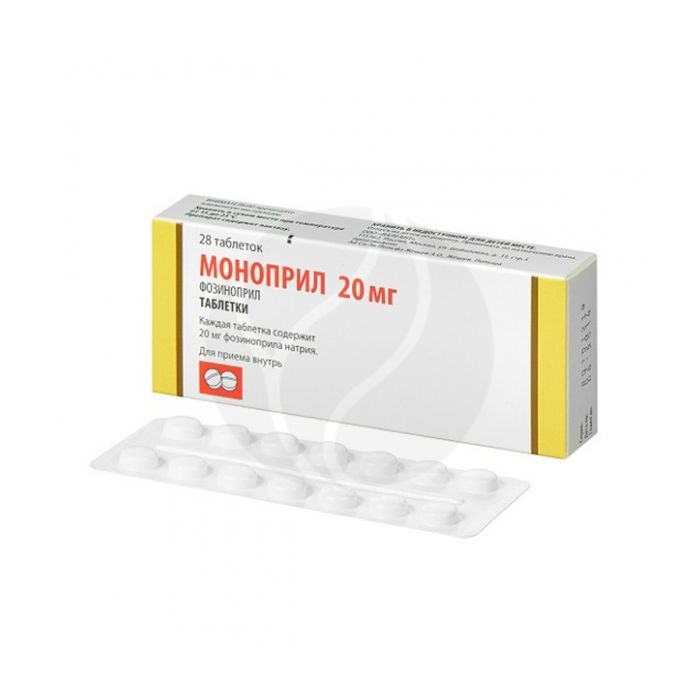Monopril tablets 20mg, No. 28
Expiration Date: 11/2025
Russian Pharmacy name:
Моноприл таблетки 20мг, №28
arterial hypertension: in monotherapy or in combination with other antihypertensive drugs (in particular with thiazide diuretics);
heart failure: as part of combination therapy.
Inside. The dosage of the drug should be selected individually.
Arterial hypertension. The recommended starting dose of the drug is 10 mg once a day. The dose must be selected depending on the dynamics of blood pressure reduction.
The usual dose is 10 to 40 mg once a day. In the absence of a sufficient hypotensive effect, it is possible to prescribe additional diuretics.
If treatment with MonoprilЃ is started against the background of ongoing diuretic therapy, then its initial dose should be no more than 10 mg with careful medical monitoring of the patient's condition.
Heart failure. The recommended starting dose is 5 mg once or twice a day. Depending on the therapeutic efficacy, the dose can be increased at weekly intervals up to a maximum of 40 mg once a day.
Arterial hypertension and heart failure with impaired renal or liver function
Since the elimination of the drug from the body occurs in two ways, dose reduction in patients with impaired renal or liver function is usually not required.
Elderly patients. There are no differences in the efficacy and safety of drug treatment between patients aged 65 years and older and younger patients. However, a greater susceptibility to the drug in some elderly patients cannot be ruled out due to possible overdose phenomena due to its delayed elimination.
| Pills | 1 tab. |
| fosinopril sodium | 10 mg |
| 20 mg | |
| excipients: anhydrous lactose; MCC; crospovidone; povidone and sodium fumarate |
in a blister 10 or 14 pcs.; in a box 1 or 2 blisters.
hypersensitivity to fosinopril or any other substance that is part of the drug;
history of angioedema, incl. and after taking other ACE inhibitors;
pregnancy;
lactation period;
age up to 18 years (efficacy and safety have not been established).
Carefully:
renal failure;
hyponatremia (risk of dehydration, arterial hypotension, chronic renal failure);
bilateral stenosis of the renal arteries or stenosis of an artery of a solitary kidney;
aortic stenosis;
condition after kidney transplantation;
desensitization;
systemic connective tissue diseases (including systemic lupus erythematosus, scleroderma) - the risk of developing neutropenia or agranulocytosis is increased;
hemodialysis;
cerebrovascular diseases (including cerebral circulation insufficiency);
Ischemic heart disease; chronic heart failure III-IV century. (NYHA classification);
diabetes;
oppression of bone marrow hematopoiesis;
hyperkalemia;
in elderly patients;
gout;
with a diet with limited salt;
conditions accompanied by a decrease in BCC (including diarrhea, vomiting, previous treatment with diuretics).

